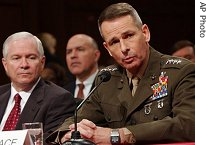2007年VOA标准英语-US Defense Secretary: Iraqi Government Seems Co(在线收听)
Capitol Hill
12 January 2007
U.S. Defense Secretary Robert Gates says American troops could begin withdrawing from Iraq later this year if the revised Iraq war plan announced by President Bush this week succeeds in reducing violence in the country. VOA's Deborah Tate reports from Capitol Hill, where Gates made his comments.
 |
| Defense Secretary Robert Gates (l) looks on as Gen. Peter Pace testifies before the Senate Armed Services Committee hearing on Iraq, 12 Jan 2007 |
Testifying before the Senate Armed Services Committee Friday, Secretary Gates defended President Bush's war strategy, which calls for more than 20,000 additional troops to be sent to Iraq.
Gates said the plan would not end sectarian violence altogether, but he said if it makes significant progress toward that end, it could lead to a drawdown of troops later this year.
"If these operations actually work, you could begin to see a lightening of the U.S. footprint, both in Baghdad and potentially in Iraq, itself," he said.
A number of lawmakers remained skeptical about the strategy, saying it depended too much on the Iraqi government keeping promises it failed to keep in the past - like the disbanding of sectarian militias.
"There is a commitment of real [U.S.] troops getting in deeper militarily on our part," said Mr. Levin. "But on the part of the Iraqis, it is just promises without consequences for the failure to live up to of those promises," said committee chairman Senator Carl Levin, a Michigan Democrat
But Secretary Gates expressed his confidence that the Iraqi government is ready to meet its commitments this time. "I think they recognize they are running out of time, not even in terms of the American political scene, but in terms of their own political scene and the deteriorating situation in their own capital," he added.
While Gates admitted that the United States has made mistakes in Iraq, he said the consequences of failure would be incalculable.
"I think it is highly likely that there would be a significant increase in sectarian violence in Iraq, that the government would probably would come apart, that the army would might come apart, so you would have increased violence, and an increased interest on the part of other players outside of Iraq in intervening to protect their interests," he explained.
Gates said the United States did not need to attack targets within Iran to counter Iranian elements that the Bush administration says are supporting the Iraqi insurgency.
Echoing the comments was the chairman of the Joint Chiefs of Staff, General Peter Pace. He was asked about Iranian and Syrian support for Iraq's insurgency.
"We know that we have had foreign fighters come through Syria. I do not know the complicity of the government, but we do know that foreign fighters travel through Syria," said General Pace. "And we do know that Iranian-supplied, made and supplied, weapons are on the streets of Baghdad killing our troops."
Senator Lindsey Graham, a South Carolina Republican, expressed strong concern about such efforts.
GRAHAM: "Well, I would like to be on record for my Senate colleagues to hear this from me, that if, in fact, the Syrian and Iranian governments are complicit in organizations and groups that are trying to kill American troops, I hope we will have the resolve, in a bipartisan fashion, to put them on notice, to put them on notice that that will be unacceptable and all options are on the table when it comes to defending Americans the jobs they are assigned. Do you agree with that, Secretary Gates?"
GATES: "Yes, sir."
The revised war strategy outlined by President Bush Wednesday has come under sharp bipartisan criticism. Senator Graham urged critics to think twice before expressing their opposition to the plan.
"Criticism, skepticism, is the heart and soul of a democracy," he added. "But our statements are being viewed not just by the Iraqi government, but those who wish us harm throughout the world. To my colleagues, I would ask, at least in the short term here, that we measure our words, that we not have a political stampede to declare the war a loss when it is not yet lost, or to embrace strategies that will lead to defeat, because I do believe this is part of the overall war on terror."
Democratic leaders in the House of Representatives and Senate are planning to bring President Bush's revised war strategy to a vote in both chambers in a symbolic action to highlight the lack of support for the plan.
The Senate's top Republican, Senator Mitch McConnell of Kentucky, has said he would try to block such an attempt in the Senate.